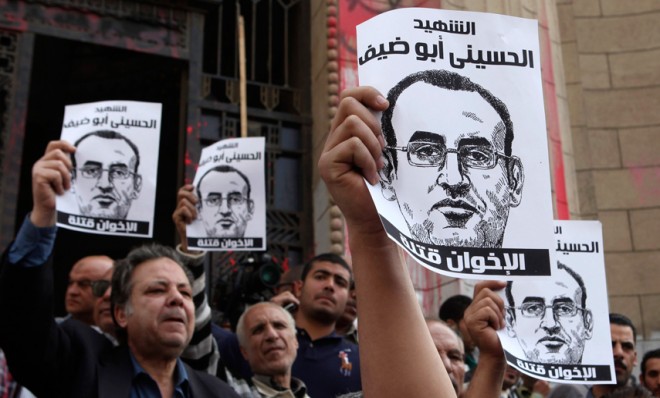Dispatch from Cairo: The wait-and-see approach is the only approach
President Obama doesn't have many fans in the Arab world, but that doesn't mean he should respond to issues in Egypt and beyond with muscle

CAIRO — The Middle East is experiencing a truly historic and dangerous moment. The tide of revolution, which started in Tunisia and swept across the Arab world, may have peaked, but the dust has by no means settled.
In the midst of this uncertainty, America — which has historically been keen on meddling in the Middle East — has by and large stayed out of the fray. As Islamist governments are coming to power in new democracies and uncertainty prevails, the Obama administration has come under fire — from political rivals and leaders in the Middle East — for its cautiousness. But those protestations shouldn't necessarily be cause for concern. After generations of a muscular, and unpopular, American presence in the Middle East, Obama's wait-and-see approach might be just what the doctor ordered.
The reality on the ground
The Week
Escape your echo chamber. Get the facts behind the news, plus analysis from multiple perspectives.

Sign up for The Week's Free Newsletters
From our morning news briefing to a weekly Good News Newsletter, get the best of The Week delivered directly to your inbox.
From our morning news briefing to a weekly Good News Newsletter, get the best of The Week delivered directly to your inbox.
Living in the region for the past few years, I have found it deeply inspiring to watch regular citizens build democratic institutions basically from scratch. That being said, the so-called Arab Spring has a visible dark side. In Egypt and Tunisia the democratic process has been riddled with assassinations and brutal street battles. My Egyptian friends, both Islamist and secular, are increasingly predicting or even advocating further political violence.
In Syria, the Arab Spring movement has turned into a brutal, sectarian bloodbath that has cost more than 60,000 lives and threatens to spread to neighboring countries. In the Sahara, bandits and extremists have raided Moammar Gadhafi's weapon stockpiles, causing carnage from Mali to Algeria. Meanwhile, the Israeli government continues to build settlements at full steam, while seemingly denying the aspirations of millions of Palestinians. As per standard practice, Israel and Palestine are one galvanizing incident away from another bloody conflict.
Many American commentators, as well as some Arabs who have benefited from American intervention, posit that this instability makes it advisable or even necessary for America to adopt a more interventionist foreign policy. Yet, those calling for America to arm Syrian rebels or to intervene in elections are implicitly advocating for a return to the policies of coercion that characterized the Bush administration, which not only invaded Iraq, but also supported ineffectual, and corrupt, leaders, and sponsored a coup in Palestine after an election there didn't turn out as planned.
This stance is not only dangerously arrogant but also risks forfeiting a golden opportunity to reshape America's fraught relationship with this vital part of the world.
A free daily email with the biggest news stories of the day – and the best features from TheWeek.com
American intervention in the Middle East — despite what some voices say — also happens to still be a pretty tough sell. Here in Cairo, and across the Arab world, the U.S. government is generally still seen as a villain. Among people I have met, a widespread interest in American culture remains, but U.S. meddling in general, and the Bush administration's disastrous policies in particular, have left our reputation so tarnished that even secular, cosmopolitan Arabs I know seem to distrust American motives and openly decry the U.S.
In Egypt, specifically, the secularist movement has made it a major piece of its platform to accuse America of installing the Muslim Brotherhood, this despite the fact that the U.S. has spent the past two decades opposing political Islam. Regimes that rely on the U.S. make a point of loudly speaking out against American policies in the region, which underlines a significant problem that Obama, or any future U.S. president, has in this region. After a decade of deaths in Iraq and generations of unconditional U.S. support for Israel, many Arabs believe that America has it out for them. Even those who take a more nuanced view don't want to be closely associated with the U.S., as it robs them of credibility.
What Arabs seem to want
With such a complex range of problems, it's too easy to think that sending American arms to the right group of Syrian rebels (whoever they are) or bombing the right targets would end the bloodshed in the Middle East. That simply isn't going to happen. Meanwhile, al Qaeda and its compatriots on the extreme fringe of Islamist politics openly hope for direct American intervention in the region, as it lends credibility to their otherwise unattractive views and radicalizes the moderates.
It should be obvious to most Americans that we cannot afford to commit to another costly conflict in this region. What might not be so obvious, though, is that despite 10 years of propaganda to the contrary, Arabs do not hate us. My Arab friends, and even people I meet in passing on buses and in the souk are generally dead-set against American foreign policy while being simultaneously fascinated and impressed with American culture. Even conservative Muslims tend to stay up on the latest Hollywood blockbusters and respect American economic prowess. Arabs do not resent us for our freedom, or for our values; they simply chafe at U.S. policy that has consistently victimized or demonized them.
Now that Arab people across the region are empowering themselves on an unprecedented scale, the U.S. should be careful not to repeat the mistakes of the past by imposing our will on the Arab world. If we want to strengthen democracy, end the threat of terrorism, and get some cheap oil while we're at it, we must instead treat the people of the region as senior partners — even when they elect Islamist governments.
Obama's policies in the region are not perfect, and most Arabs don't have many nice things to say about him, but compared with his rivals and predecessors, his cautious approach is not only a step in the right direction, it's the only move he can make.
Jake Lippincott earned a degree in Middle Eastern Studies at Hampshire College. He worked in Tunis during the popular uprising there, and is now based in Cairo.
-
 Political cartoons for January 25
Political cartoons for January 25Cartoons Sunday's political cartoons include a hot economy, A.I. wisdom, and more
-
 Le Pen back in the dock: the trial that’s shaking France
Le Pen back in the dock: the trial that’s shaking FranceIn the Spotlight Appealing her four-year conviction for embezzlement, the Rassemblement National leader faces an uncertain political future, whatever the result
-
 The doctors’ strikes
The doctors’ strikesThe Explainer Resident doctors working for NHS England are currently voting on whether to go out on strike again this year
-
 The billionaires’ wealth tax: a catastrophe for California?
The billionaires’ wealth tax: a catastrophe for California?Talking Point Peter Thiel and Larry Page preparing to change state residency
-
 Bari Weiss’ ‘60 Minutes’ scandal is about more than one report
Bari Weiss’ ‘60 Minutes’ scandal is about more than one reportIN THE SPOTLIGHT By blocking an approved segment on a controversial prison holding US deportees in El Salvador, the editor-in-chief of CBS News has become the main story
-
 Has Zohran Mamdani shown the Democrats how to win again?
Has Zohran Mamdani shown the Democrats how to win again?Today’s Big Question New York City mayoral election touted as victory for left-wing populists but moderate centrist wins elsewhere present more complex path for Democratic Party
-
 Millions turn out for anti-Trump ‘No Kings’ rallies
Millions turn out for anti-Trump ‘No Kings’ ralliesSpeed Read An estimated 7 million people participated, 2 million more than at the first ‘No Kings’ protest in June
-
 Ghislaine Maxwell: angling for a Trump pardon
Ghislaine Maxwell: angling for a Trump pardonTalking Point Convicted sex trafficker's testimony could shed new light on president's links to Jeffrey Epstein
-
 The last words and final moments of 40 presidents
The last words and final moments of 40 presidentsThe Explainer Some are eloquent quotes worthy of the holders of the highest office in the nation, and others... aren't
-
 The JFK files: the truth at last?
The JFK files: the truth at last?In The Spotlight More than 64,000 previously classified documents relating the 1963 assassination of John F. Kennedy have been released by the Trump administration
-
 'Seriously, not literally': how should the world take Donald Trump?
'Seriously, not literally': how should the world take Donald Trump?Today's big question White House rhetoric and reality look likely to become increasingly blurred